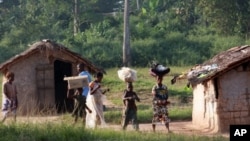The Red Cross says refugees from Ivory Coast's political crisis are stretching water and sanitation facilities across the border in Guinea.
More than 30,000 refugees have fled the political crisis between competing presidents in Ivory Coast. Most of those refugees have gone to Liberia where the United Nations is building a camp that should be ready later this month.
Some of those refugees have gone to Guinea, where they are living in villages along the border that are already disrupted by the return of Guinean civilians who fled their own electoral violence.
Moustapha Diallo is the West Africa communications officer for the International Federation of Red Cross and Red Crescent Societies. "The refugees have all fled from villages located between the towns of Danane and Guiglo in western Cote d'Ivoire, and they are seeking refuge with relatives and friends with limited access to water, lack of food, insufficient number of latrines in the host family," he said.
Over the last two decades, Guinea's southeastern forest region was home to thousands of refugees from civil wars in Liberia and Sierra Leone. Late last year the region hosted internally-displaced Guineans fearing electoral violence in the vote to return Guinea to civilian rule.
Now families in the already-underdeveloped forest region are sharing food stocks with Ivorian refugees who Diallo says are starting to strain water and sanitation facilities. "The current need already exists in the host communities, so the situation is becoming untenable for the host families in Guinea," Diallo.
The United Nations children's fund says the number of Ivorian refugees in the subregion could reach 50,000 by the middle of February and as many as 100,000 by April.






